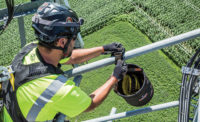Napping at work. It's a thing.

Workers in India overwhelmingly want a “nap room” in their workplaces, according to a survey conducted by online sleep-solutions startup Wakefit.co.
According to a report on the survey titled “Right to Work Naps,” a startling 86 percent of the 1,500 respondents said they wanted a dedicated space for taking naps during their work shifts. Some 40 percent reported experiencing irregular sleep due to work-related stress or lack of time for sleeping.
Wakefit.co questioned Indian workers about sleep patterns, most productive hours for working, and general levels of well-being at the workplace.
Seventy percent of the respondents do not have a nap room at their workplace. Nearly a fifth of the respondents felt sleepy at work all the time. Twenty-five percent attributed their sleep deprivation to stress caused in part by long commutes. Not surprisingly, afternoon hours – between 1 p.m. and 4 p.m. – were identified as the drowsiest time of the day.
In the U.S., 29 percent of workers report falling asleep or becoming very sleepy at work, according to Sleep.org. That has a very real cost to businesses: about $63 billion a year in lost productivity.
Sleep.org says a short (twenty-minute) nap can boost alertness and improve performance—both important when you’re on the job.
The idea of napping in U.S. workplaces is slowing gaining traction, thanks in part to millennials and their nontraditional approach to work.
Ice cream maker Ben & Jerry’s, based in Burlington, Vermont, has a room for employee napping that’s equipped with a bed and pillows.
Online shoe retailer Zappos has a nap room at its Las Vegas, Nevada headquarters furnished with all kinds of sleeping options, including a couch, recliners and a beanbag chair. Athletic gear giant Nike has “quiet rooms” at its Portland, Oregon headquarters that can be used for napping or meditation.
EnergyPods (shown above), which are designed to be used for naps at work, have begun popping up in Google, NASA, Samsung, Huffington Post, Proctor and Gamble and university facilities. EnergyPods offer users a zero-gravity sleeping position and consume minimal space.
Looking for a reprint of this article?
From high-res PDFs to custom plaques, order your copy today!






